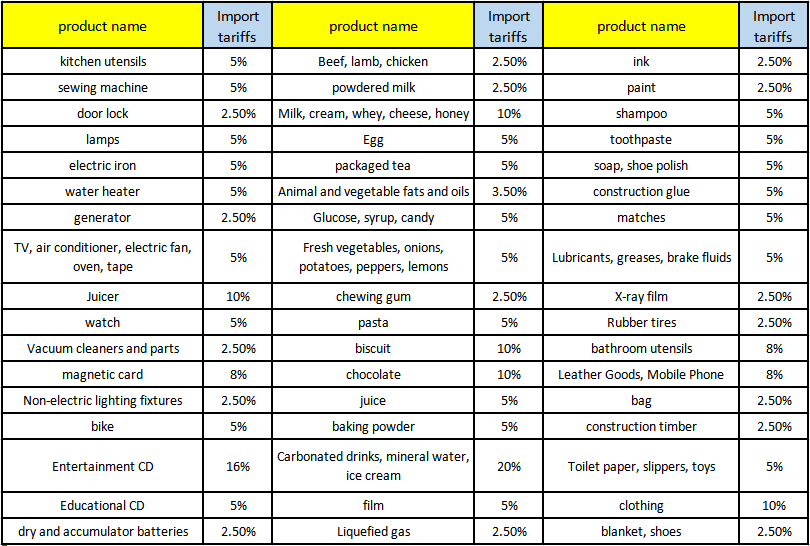Be your Logistics Department in China
Customized logistics solutions, your logistics expert in China
Customized logistics solutions, Shipping from China to the World
Tel:+8613424475220 Email:info@viputrans.com 
China-Afghanistan export transportation
There are two main transportation modes for transporting bulk goods from China to Afghanistan. One is to transport goods by sea to Karachi seaport and then land transportation through Pakistan. It is also the main mode of transportation of goods between China and Afghanistan. It is also the route with the lowest price and transportation time. It's about 40 days.
The other is to first truck the goods to Kashgar, from which the containers are trucked across the border to the Kyrgyz city of Osh. Here, they are loaded onto trains and continue their journey through Central Asian countries to their final destination, Khairatan, Afghanistan. The transit time is approximately 20 days.
Railway freight and transportation time:
Route: Main cities in China-Kashgar-Osh-Hiraton
Price: USD8950/40HQ
USD15000/2*20GP
Transportation time: 7 days for domestic truck transportation + 14 days for rail transportation, about 21 days

Ocean freight and transit time:
Based on the current sea freight prices are as follows (September 2023):
| POD | POL | 20ft | 40ft | Transport time |
| Karachi | Dalian | 825 | 1540 | 23 |
| Qingdao | 825 | 1540 | 16 | |
| Shanghai | 725 | 1340 | 24 | |
| Guangzhou | 825 | 1390 | 20 |
CFR price Karachi to Kabul freight
COMMERCIAL CARGO: 20’GP Container--- USD 2100
40’GP Container--- USD 3100
NON COMMERCAIL CARGO:20’GP Container--- USD 1900
40’GP Container--- USD 2900
The above fee is an "all-inclusive" price, which covers port fees, Pakistani transshipment clearance, Afghan border customs procedures and other documents, as well as empty container return fees (Afghanistan has not signed an international container transport agreement).
Detention of containers
The general container detention period of shipping companies is 10 days. If the period exceeds the period, detention fees will be calculated on a daily basis. The round trip cycle from Karachi to Kabul to Karachi is 23-25 days. For NON COMMERCAIL CARGO, the goods must be transferred to trucks in the border area (Peshawar, Pakistan) and then transported to Kabul, which takes about 15 days. Based on the aforementioned 10-day detention period, the approximate detention fee is US$8 per standard container per day (0-10 days) or US$10 per day (10-20 days).
Remark:
A. All documents or packages must be marked with the words "GOODS IN TRANSIT TO AFGHANISTAN VIA KARACHI/ PAKISTAN".
B. The cargo bill of lading should indicate the name and address of the consignee in Afghanistan.
C. Indicate the name and address of the carrier of the goods
D. Obtain an import license issued by the Afghan Chamber of Commerce.
E. Since Pakistan Customs does not allow changes, be sure to ask the agent in Karachi to fill in the Afghanistan Transshipment Manifest (AFGHAN TRSNSIT MANIFEST) correctly and clearly.
F. Documents required by shipping agency:
1. Ocean bill of lading/air transport bill of lading (Bill of Lading/) original + copy
2. Commercial invoice: 5 original copies
3. Packing list: 5 original copies
4. One original copy of Route Permit from the Central Board of Revenue of Pakistan (Humanitarian Materials)
5. One original copy of the tax exemption certificate from the Ministry of Commerce of Afghanistan (if any)
6. Certificate of origin original + copy
7. Original Afghanistan import license
8. Original Afghanistan commercial invoice
The general customs clearance time in Karachi is 3-5 days. It takes about 10-14 days to transport from Karachi to Peshawai or Quetta on the Afghanistan-Pakistan border. After simple customs transfer procedures, it will be verified by Afghan customs checkpoints and the goods can be transported to Afghanistan. Afghanistan's customs inspection point is located at Gumrock, while the one leading to Kandahar is located at Spin Boldak. Customs clearance at the Afghanistan-Pakistan border takes 1-2 days. Transportation from the Torkham border area to Kabul takes at least 2-3 days, and from the Chamman border area to Kandahar at least 2 days.
Transport routes and distances
Karachi-Peshawar-Torkham-Kabul (total length 2010Kms)
Karachi---Peshawar (1707Kms):Karachi Port、 Hyderabad、Moro、Noshera Feroz、 Ranipure、 Sukkur、By-Pass、Ghotki、Goth Machi、Sadiqubad、Bhawalpure、Khanewal、Lahore、Sheikhupura、Gujranwala 、Gujrat、Lalamusa、Jehlum、 Rawalpindi、Texila、Attock、Cherat、Nowshera、Peshawar
Peshawar----Torkham((Afghanistan-Pakistan border, 55Kms):Peshawar、Khyber Tribal Area、Jamrud Fort、Ali Masjid、Gurgura、Sultan Khel、Landi Kotal、Khyber Pass、Torkham Pak-Afghan Border
Torkham---Kabul(303Kms):Torkham Border、Gumrock、Jallalabad、Kabul。
Karachi-Quetta-Chamun-Kandahar (total length 913 Kms)
Karachi-Quetta(670Kms):Karachi Port、Hub Choki、Gadani、Vinder、Uthal、Bela、Wadh、Khazdar、Shrab、Kallat、Mustang、Quetta。
Quetta-Chamun(132Kms):Quetta、Kuchluck Town、Yaro Town、Qila Abdullah Town、Shalabagh Mountain Area、Chamman City、Chamman Pak-Afghan Border。
Chamun-Kandahar(111Kms):Chamman Border、Waish、Spin Boldak Town、Mall Bridge、Argasan Bridge、Kandhar Airport、Kandahar City。
Importers need to note that in order to control the smuggling problem, the Pakistani government has been taking restrictive measures on Afghan transit goods. There are currently 18 types of embargoed materials. If you do not have an import license, do not ship these materials in containers to avoid fines and other penalties. .
The list of prohibited materials is as follows: (1) Cigarettes, (2) All yarns except cotton yarn, (3) Dyes and chemicals, (4) PVC and PMC products, (5) Black tea, (6) Capacitors, (7) Silk handicrafts, (8) vegetable ghee, (9) cooking oil, (10) internal and external tires, (11) refrigerators, (12) air conditioners, (13) televisions and parts, (14) soaps and shampoos , (15) car parts, (16) telephone, (17) razor, (18) video camera.
When transporting materials from home to Afghanistan, you must choose a good transportation agent, especially for transportation in Pakistan. The total transportation cost of entrusting different agents can vary by US$1,000-2,000, which can also save a lot of trouble and a lot of time.
Relevant regulations on trade management
Afghanistan has no restrictions on commodity imports.
Commodities prohibited from import: wine, pigs, pork, lard, cottonseed, drugs, guns and explosives.
The Afghan government encourages the export of its own goods.
Goods prohibited from export: drugs, antiques, rare mineral resources and other items regulated by the government.
TIR Shipping:
TIR (Transports Internationaux Routiers) is an international system for customs transit that allows goods to move across multiple borders with minimal inspection and delays. It operates under the TIR Convention, an agreement between participating countries and regions that facilitates the transit of goods from one country to another without being subjected to detailed customs checks at each border crossing. TIR is a trusted method for transporting goods safely and efficiently over long distances, particularly in regions with complex customs processes.
This system is designed to streamline the movement of goods by minimizing paperwork, reducing waiting times, and simplifying the customs clearance procedures. The main advantage of TIR is that goods are transported under customs control, but once sealed in a TIR carnet (a transit document), they do not require rechecking until the final destination is reached.
TIR Shipping from China to Afghanistan:
When it comes to shipping goods from China to Afghanistan, the TIR system plays a crucial role in facilitating efficient cross-border trade, especially considering the complexity of logistics and border regulations in Central Asia. Here’s a breakdown of the key aspects of TIR shipping for this route:
Customs Clearance:TIR shipping ensures that customs clearance is simplified at various border crossings. The goods are sealed in a TIR carnet and transported with minimal inspections, reducing delays and improving transit time. Customs authorities in participating countries accept TIR carnets as a guarantee of duties and taxes, ensuring a smooth flow of goods.
Warehousing and Storage:TIR shipping integrates essential warehousing services at key transit points. In the case of shipping from China to Afghanistan, goods may need to be stored in secure facilities while waiting for customs clearance or during transshipment between borders. These warehouses are equipped to handle a variety of goods, offering both short-term and long-term storage solutions.
Cargo Handling and Loading/Unloading:Efficient cargo handling is vital to the success of any international shipment. TIR shipping ensures that goods are properly loaded, unloaded, and managed at each stage of the journey. Dedicated loading docks and experienced personnel ensure that the cargo is secured in compliance with international regulations, preventing damage or loss during transport.
Route Development:Shipping from China to Afghanistan involves navigating a series of international routes and border crossings, many of which are subject to shifting geopolitical and logistical challenges. TIR shipping helps develop efficient routes that take advantage of well-established corridors for international trade. These routes are constantly assessed and updated to ensure that goods reach their destination in the most time-efficient and cost-effective manner.
Transportation Capacity: VIPU has integrated all the necessary TIR transit services, which significantly enhance the capacity for transporting goods across multiple borders. TIR shipments from China to Afghanistan benefit from a network of reliable carriers and transport vehicles, providing flexibility to meet diverse shipping needs, including bulk shipments or specialized cargo.
Simplified Customs Procedures: One of the greatest benefits of TIR shipping is the simplified customs procedures. The TIR carnet eliminates the need for numerous paperwork and inspections at every border. This significantly speeds up the clearance process, especially in regions with complex customs systems, such as Afghanistan.
Faster Transit Time: The streamlined customs procedures reduce delays, ensuring faster delivery of goods.
Cost Efficiency: The reduced paperwork and fewer inspections result in lower overall costs.
Reduced Risk of Theft or Damage: Goods are sealed within TIR-approved containers, which reduces the risk of theft, loss, or damage.
Reliable Transit Across Borders: TIR offers a reliable and predictable transit experience even across regions with political or logistical challenges.
Compliance with International Regulations: TIR shipping complies with international customs regulations, ensuring that all goods are properly documented and meet legal requirements.
Import and export commodity inspection and quarantine
Afghan Customs inspects imported goods, but the inspection and quarantine equipment and technology are backward. Goods exported from China to Afghanistan must issue Chinese commodity inspection reports in accordance with regulations.
Import tariffs on some Afghan products

If you have any shipping needs from china to Afghan, please feel free to consult Viputrans Lora Yang E-mail: sales02@viputrans.com
SKYPE|WECHAT|WHATSAPP|MOB:+86 13424468029
VIPU SUPPLY CHAIN LOGISTICS CO.,LTD
Copyright © 2003-2026 VIPU Supply Chain Logistics Co., Ltd. | All Rights Reserved
LOGISTICS | E-COMMERCIAL FULFILLMENT | ABOUT US | CASE | NEWS | VIDEO | CONTACT US
We will find the fastest or the cheapest way for your shipment. Please specify: where from, where to, what to ship.